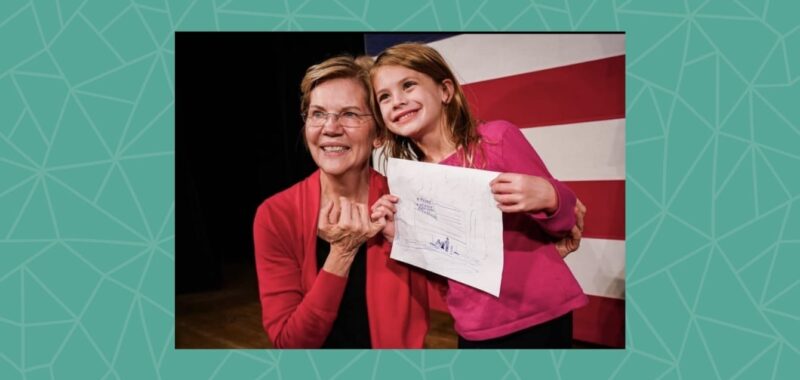We’ve all heard it: “You can’t be what you can’t see.” And as moms, we hope our daughters grow up in a world where their ambition isn’t limited by outdated ideas about what girls can or can’t do. Whether we’re pointing out a woman on the debate stage or sharing the stories behind who’s on the ballot, we want our kids—especially our daughters—to believe they belong in every room, every conversation, every vote.
The idea that seeing women in prominent roles can inspire young girls has long resonated. From politicians like Kamala Harris being described as a unique role model for daughters, to Elizabeth Warren making “pinkie promises” with young girls about their potential, the hope has been that witnessing women in power would encourage future female engagement in politics. Even figures like Nikki Haley have spoken about the impact of their presence on young girls envisioning their own futures.
Now, compelling new research from Christina Wolbrecht and David E. Campbell, published in the journal Political Behavior, offers the first longitudinal evidence that this intuition holds true. In what the authors describe as a first-of-its-kind study, they followed over 6,000 adolescents into adulthood and discovered that girls who were exposed to a novel, viable woman candidate—defined as a woman running a competitive campaign for a seat previously held by a man—were significantly more likely to vote as adults. This enduring effect held even after controlling for a wide range of individual and contextual factors known to influence voter turnout.
The researchers categorized candidates based on their viability (whether they won or came within 10 points of winning), novelty (challenging a male incumbent), and visibility, showing that exposure to novel, viable candidates—even if they lost—had the strongest effect on later civic engagement among young women.
Related: How to Talk About Politics with your Kids
Challenging stereotypes: seeing is believing
The study’s core theory posits that the presence of women in the political arena directly challenges the deeply ingrained stereotype that politics is a “man’s game.” When young women observe other women actively participating and running credible campaigns, it conveys a powerful message: the political sphere is a space where they belong. This incidental exposure—whether on a billboard, in a local debate, or through casual conversation—can reshape what girls understand as possible or appropriate for women, encouraging long-term political engagement.
Interestingly, the research underscores that running a campaign—not necessarily winning—is what influences future voter turnout. A woman’s visibility and credibility during a campaign are what make a lasting impression.
A pathway to participation for those without political family influence
One of the study’s most significant findings is that the role model effect was most pronounced for girls from less politically engaged households. For teens who rarely discussed current events with their parents, the presence of a woman candidate during their adolescence led to a 10 percentage point increase in the likelihood of voting later in life—bringing their turnout rate in line with peers who had frequent political discussions at home.
This “compensatory effect” mirrors patterns seen in civic education research, where structured school environments provide an alternate pathway to political participation for those without strong civic socialization at home.
In contrast, the study found no significant effect on boys’ voter turnout related to adolescent exposure to women candidates, supporting the idea that women role models have a unique influence on young women navigating gendered norms around politics.
The formative years: why adolescent exposure matters
The researchers underscore that adolescence is a pivotal time for political learning. Even by early adolescence, children often understand politics as gendered—something “for boys.” Exposure to women running serious campaigns during these impressionable years helps counteract that message. And because early voting tends to be habit-forming, that first civic action may lead to a lifetime of engagement.
The broader impact: inspiring future engagement
For moms raising girls today, this research is more than academic—it’s affirming. It tells us that what our daughters see in the world matters. That the campaigns we watch together, the stories we tell, the conversations around the dinner table, all add up. Even if your home isn’t buzzing with political talk, simply witnessing women run for office—especially when those women are breaking barriers—can be enough to plant the seeds of civic engagement.
So whether your daughter is in a stroller at a rally or catching glimpses of the evening news, remember: she’s watching. And what she sees can shape who she becomes.
Related: 7 months pregnant on the campaign trail: How motherhood has changed the way I view politics

